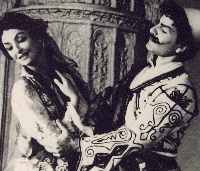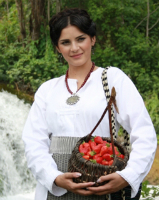0
















| Thumbs Up |
| Received: 5,525 Given: 4,512 |

Dalmatian was a Romance language spoken in the Dalmatia region of Croatia, and as far south as Kotor in Montenegro. The name refers to a pre-Roman tribe of the Illyrian linguistic group, Dalmatae. The Ragusan dialect of Dalmatian was the official language of the Republic of Ragusa, though in later times Italian (representing the Romance language population) or Croatian (for the Slavophone population) came to supersede it.
The Roman Republic gradually came to occupy the territory of Illyria between 229 and 155 BC. Merchants and authorities settling from Rome brought with them the Latin language, and eventually the indigenous inhabitants mostly abandoned their languages (prevalently a variety of Illyrian tongues) for vulgar Latin. After the Roman capital moved to Constantinople, Greek began to replace Latin as the Lingua Franca in the empire (eventually becoming official in 620), but Illyrian towns continued to speak Latin, which evolved over time into regional dialects and eventually into distinct Romance languages.
Almost every city developed its own dialect. Most of these became extinct before they were recorded, so the only trace of these ancient dialects is some words borrowed into local dialects of today's Croatia. Once thought to be a language that bridged the gap between the Romanian language and Italian, it was only distantly related to the nearby Romanian dialects, such as the nearly extinct Istro-Romanian, spoken in nearby Istria, Croatia.
Dalmatian was influenced particularly heavily by the Venetian language and Croatian (despite the latter, the Latin roots of Dalmatian remained prominent). A fourteenth century letter from Zadar shows strong influence from Venetian, the language that after years under Venetian rule extinguished Iadera and other dialects of Dalmatian. Other dialects met their demise with the settlement of populations of Slavic speakers.
The language became extinct when its last speaker, Burbur Tuone Udaina, was killed in an industrial explosion on 10 June 1898.
Lord's Prayer in Dalmatian:
Tuota nuester, che te sante intel sil,
sait santificuot el naun to.
Vigna el raigno to.
Sait fuot la voluntuot toa,
coisa in sil, coisa in tiara.
Duote costa dai el pun nuester cotidiun.
E remetiaj le nuestre debete,
Coisa nojiltri remetiaime a i nuestri debetuar.
E naun ne menur in tentatiaun,
miu deleberiajne dal mal.















| Thumbs Up |
| Received: 3,713 Given: 3,033 |

It most probably sounded something like Albanian in the beginning (like it's concluded etymology).
After that, the proto-Albanian people basically became ''Vlachs'' (latinized natives).
The prayer is heavily latinized, could you post some of the surviving words?














| Thumbs Up |
| Received: 105 Given: 1 |

Teh language died out recently, its a pity indeed.














| Thumbs Up |
| Received: 1,961 Given: 2,131 |

agree on that , me also understand all that
however still today there are italians ethnic minority in some dalmatian places , in catarro (montenegro) , and in istria still today some places are in majority italians
from wikipedia:
Main Dalmatian Italian associations
In contemporary Dalmatia there are several associations of Dalmatian Italians, mainly located in important coastal cities:
The Italian Community of Zadar (Comunitą Italiana di Zara). Founded in 1991 in Zadar, with an Assembly of 236 members. The current president is Rina Villani (who has been recently elected [14] in the Zadar county, or Županija). The former president of the CI, Dr. Libero Grubišić, started the first Italian courses in the city after the close of all the Italian school in Zadar in 1953. The actual vice president, Silvio Duiella, has promoted the creation of an Italian Choral of Zadar under the direction of Adriana Grubelić. In the new offices, the CI has a library and organizes several courses of Italian and conferences.[15]
The Italian Community of Split (Comunitą Italiana di Spalato). Was created in 1993 in Split, with an office near the city's trademark Riva seashore. The president is Eugenio Dalmas and the legal director is Mladen Dalbello. In the office, the CI organises Italian language courses and conferences.[16] This CI has 97 members.
The Italian Community of Mali Lošinj (Comunitą Italiana di Lussinpiccolo). Created in 1990 in the northern Dalmatian island of Lošinj. This CI was founded thanks to Stelio Cappelli (first president) in this little island, that was part of the Kingdom of Italy from 1918 to 1947. It has 461 members under the actual leadership of Anna Maria Saganici, Livia Andrijčić and Andrino Maglievaz. The activities are run in a place offered by the local authorities. The library has been donated by the local Rotary Club.[17]
The Italian Community of Kotor (Comunitą Italiana di Cattaro), in Kotor is being registered officially (with the "Unione Italiana") as the Italian Community of Montenegro (Comunitą degli Italiani del Montenegro). In connection with this registration, the "Center for Dalmatian Cultural Research" (Centro di Ricerche Culturali Dalmate) has opened in 2007 the Venetian house in Kotor to celebrate the Venetian heritage in coastal Montenegro.
The "Dante Alighieri" Association. The "Dante Alighieri" is an Italian government organization that promotes Italian language in the world, with the help of the Italian speaking communities outside Italy. In Dalmatia is actually present in:
- Zadar [18]
- Split [19]
- Dubrovnik [20]
- Kotor [21]
In the city of Rijeka (Fiume), that geographer Vialli considers partially Dalmatian, 7,000 Italians have a local Italian Community,[22] the Dante Alighieri [23] and the Italian Drama (Dramma Italiano) (a theatre organization in Italian language, based in the Croat National Theatre Ivan Zajc).
italians in istria:
http://en.wikipedia.org/wiki/File:It...stria_2001.png















| Thumbs Up |
| Received: 237 Given: 48 |

bimo,those Italians have nothing to do with Romano-Illyrian population.














| Thumbs Up |
| Received: 1,961 Given: 2,131 |
There are currently 1 users browsing this thread. (0 members and 1 guests)
Bookmarks